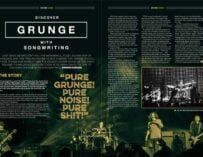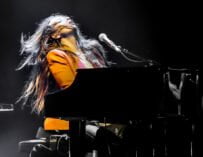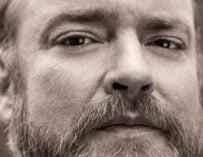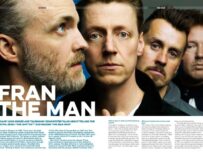
Songwriting speaks to a multi-platinum artist who’s one of the most well-known and critically acclaimed songwriters of his generation
For some it would be enough to be the principal songwriter behind one of the premier acts in an epoch-defining genre. Chris Cornell, though, is not just any writer, having carved out a career as a noted and respected solo artist, while contributing to a number of musical projects during his four decades in the music industry.
Initially starting as the drummer, Cornell then became known as the firebrand vocalist behind Seattle band Soundgarden. Soundgarden became pioneers of the early 90s grunge movement, with their second album Badmotorfinger taking them to platinum status before they released their magnum opus Superunknown in 1994. Released to huge fanfare, Superunknown reached No 1 on the US Billboard 200 record chart and No 4 on the UK Albums Chart and has since been recognised as one of the finest albums of its era. Soundgarden then released Down On The Upside in 1996, before breaking up a year later.
In 1999 Cornell released his first solo album Euphoria Morning. Adopting a lighter tone than much of his work with Soundgarden, the record saw Cornell cement his reputation as one of the finest songwriters of his generation. Two years later Cornell formed Audioslave with former Rage Against the Machine members Tom Morello, Tim Commerford and Brad Wilk. Cornell went on to record three albums with Audioslave, departing after their 2006 LP Revelations.
It was in this year that he would open his solo work up to a new audience, recording You Know My Name with David Arnold, which was used as the theme song to the James Bond film Casino Royale. You Know My Name saw Cornell nominated for a Grammy Award and featured on his second solo album, 2007s Carry On. Cornell released his third solo album Scream in 2009 and the live album Songbook in 2011, before the reformed Soundgarden returned with their sixth studio album King Animal in 2012.
Songwriting spoke to Chris as he released his fourth studio Higher Truth and found out what the difference is, for him, between writing as part of a band and as a solo artist…
 You have a new solo album coming out, a reissue of your first solo LP and it was recently announced there is to be a new Soundgarden record soon. A busy year for you so far?!
You have a new solo album coming out, a reissue of your first solo LP and it was recently announced there is to be a new Soundgarden record soon. A busy year for you so far?!
“Yeah, they all kind of are!”
Where do you find the time to keep your inspiration going?
“The inspiration part just seems to kind of sort itself out, it’s just a matter of trying to push myself in different directions and everything else just kind of does what it’s supposed to do. Which is not to say that it’s not a challenge, because it is, but that’s always been part of making albums and touring; I don’t know if it would be easy to stay focused if wasn’t some kind of a challenge around every corner.”
So if things were easy then you wouldn’t need to test yourself and things would remain the same?
“Yeah, it would be difficult to devote so much time and effort if things stayed the same; that would be like coal mining.”
“’Higher Truth’ is the closest thing to a concept album I’ve made”
Your new album has been called stark, but it seems quite warm to us. How do you see it?
“As a solo artist, if that isn’t the first thing that you were known for, there’s always this ability to drift off into anything. One of the challenges on this album was to not do that, to stay focused, and in that regard I guess Higher Truth is the closest thing to a concept album I’ve ever made. I stayed religiously focused to the notion that I was making a stripped-down, acoustic-based album, unlike one I’ve ever made but sort of harking back to different songs that I’ve made in the past, like Seasons or songs that I wrote for Temple Of The Dog.”
Could you explain the writing process for the songs on your new album?
‘The song Higher Truth was a good example. The first demo was pretty much the one that we based the album version on: we’re doing all the same things, it’s the same length, the same song. And at the end of it I circled back to this notion that I wanted the songs to be stripped down to an acoustic song first, and I felt that song in particular, once I got to the bridge it just seemed to need something – the drums were just dying to come in on the second verse, it just seemed like a song that wasn’t going to flow with just an acoustic guitar.
“So I decided to scrap it and rearrange it and kind of re-write it as a different song, more of a singer-songwriter acoustic song. So I did that and demoed a version of that and hated it, it was awful, and I don’t think I even finished it. I may have even tried a third version, or different metamorphoses, and nothing worked. So the idea was thrown out and I cut my losses and moved on.Then when I was putting together all my demos to send to Brendon O’Brian, the producer, I got to that one and listened to the original demo and really liked it. And I thought, ‘If there’s drums coming in on the second verse who cares? I like it. I’m not going to not put a song on my record just because it doesn’t sound like a singer-songwriter folk-ballad’.
“Having said all that, after the fact, if I just sit in a room and play it on acoustic guitar, it comes across great. So I just didn’t have perspective and the way that I got perspective was a process of elimination, as opposed to when you’re working in a band and you’re just bouncing off of each other.”

Chris Cornell
Do you think it’s harder as a writer to come up with the whole idea as a solo artist, or to come in with parts of an idea when you’re in a band?
“As a solo artist there needs to be a lot of fiction involved to some degree, it’s harder to step outside of yourself and look back and say ‘What is this guy singing about?’ because that guy’s you; it’s not a band that’s gone off to have its own life. And I think that the way that I was able to do it was to view the narrator, the singer, as a character.
“One of the more vivid ones to me is the character singing Worried Moon. He’s not me; he’s a character that I would put in a novel, were I a novelist. And I’m writing his story and what he’s going through in the moment and what his concerns are, I’m writing a small play and he’s the sole character besides this inanimate object that he starts to attribute human characteristics to, so that he has someone to talk to – like Tom Hanks did with the volleyball in Castaway.
“Even though this is a character I’ve created, there’s a lot of me in it”
“And at the end of it I can read the lyrics and realise that ‘Okay, even though this is a character in a story that I’ve created, there’s a whole lot of me in it.’ And there is, but it made it easier to create a guy – and there’s a couple of different guys in this record, but it’s mostly just one guy in this record who’s singing these songs and having these experiences. I think it’s easier to allow yourself to share personal experiences, thoughts, feelings and emotions when you’re doing it through some character that you’ve created.
“It kind of reminds me of Kurt Vonnegut when he did Slaughterhouse Five and he said a bunch of times in interviews that, because he was in Dresden when it was bombed and was one of the handful of survivors, people said “Why don’t you write a book about it?”. And he said that he couldn’t, that it was too intense and it was too much and he was too close to it. When he wrote Slaughterhouse Five, the way that he was able to do it was that he writes in this insane, detached science fiction, part of which is this layered-in story of time travel and when the person travels into this one specific time it’s Earth during the Dresden firing bombing and he’s able to tell the story.
“My song isn’t that dramatic but it’s the same concept – creating characters and creating fictional stories through which you’re able to easily tell your own.”
Interview: Damien Girling
Chris Cornell’s fourth solo album Higher Truth is out now. You can read what we thought of it here.



































Related Articles